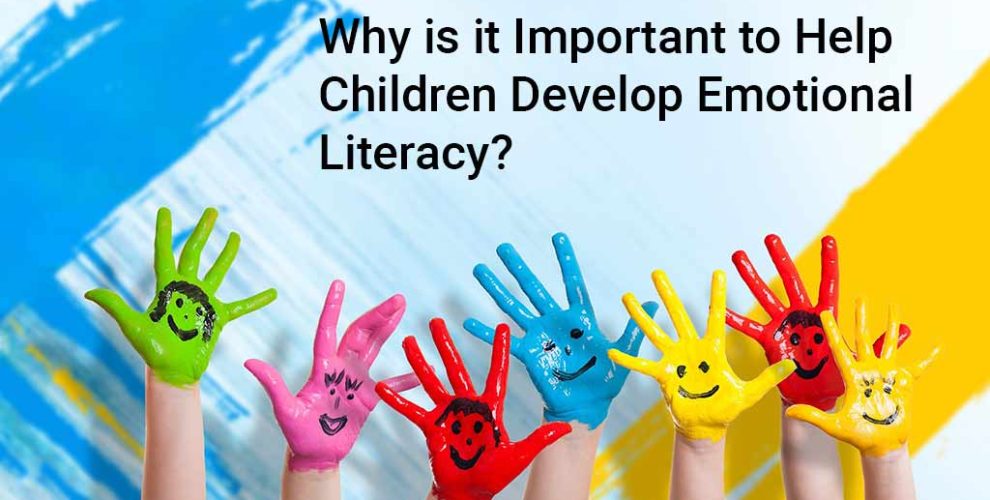As a parent, you are used to meltdowns and tantrums of your young ones at the oddest hours and for the weirdest of reasons. We tend to think of our children as incapable of understanding or processing the emotional complexities. Most parents have the tendency of protecting their kids by refraining from bringing up the less pleasant and tricky subject of emotional control. However, emotional literacy is one of the key aspects of intellect and a significant element of social learning skills. So, rather than waiting for the kids to outgrow the phases of emotional upheaval, it is crucial that we use this window to teach them the emotional literacy skills that can yield both immediate and long-term benefits.
Research has shown that kids who are given the training of emotional literacy at a young age exhibit less anxiety and aggression and turn out to be better social problem-solvers. This pro-social behavior in the early childhood is strongly connected to sound mental health and future academic progress. The outcomes are also seen in a more amiable classroom environment and better attention span. Thus, when children are taught nuances like how to calm themselves down, treat others with kindness, being mindful of other’s feelings, and using apt language to express their feelings, it is basically the foundation of their future wellness and success.
The brains of your growing child develop at a rapid pace, and they are all constantly noticing, adapting, reacting, and developing thoughts and ideas based on their emotional experiences. So, until they are taught the right channels to bring out their emotions, it will culminate in them, taking up the wrong ways, and hurting others and themselves in the process.
We educate our children on so many subjects, and we teach them the necessities like spellings and pronunciations that will help them do well in their life ahead. But when we fail to equip them with emotional education, we are ultimately stopping them from improving their quality of life in the future.
When you are teaching emotional intelligence to the kids, you are educating them about how they can recognize their feelings, understand where those feelings come from, and how to deal with the feelings. The reason these are known as the most crucial skills is that it all adds up to their Emotional Quotient or EQ. Young people with high EQ are seen to earn higher grades, not turn truants, and take up healthy choices. The following are some of the major elements of EQ that help the children to be more in control of their emotions.
- Self-awareness: Recognition of their own feelings.
- Self-regulation: Ability to normalize and control their reaction to each of the emotions.
- Internal motivation: This is about having a sense of what is necessary in a moment and for life.
- Empathy: Being considerate of the emotions of the people around.
- Social skills: Encouragement to increase social connectivity.
Different Ways to Develop Emotional Literacy in Children
Bringing emotional literacy in children is not as difficult a hurdle as it sounds and putting the following techniques to use can make a world of difference.
- Build emotional vocabulary: Teach children to recognize and label the feelings correctly. The plethora of emotions from sad, mad, glad, surprised, upset to worried can be taught using flashcards. Ask them to identify the emotions and carefully notice how exactly they identified it. You can then move on to teaching them about taming the emotions according to situations.
- Normalize emotions for them: Emotions need not be classified as bad or good, as such strong words can overwhelm the kids. Normalize their response to the stimulus by helping them see that such emotions are not exclusive to them only. Remind them that everyone, including you, feels those emotions sometimes or the other and it is okay to feel as long as they know how to handle. Children learn a lot by example so make sure you handle your emotions in front of them.
- Practice mindfulness: Mindfulness is the process of getting one’s attention to the experiences that are presently occurring. It is a wonderful way to improve emotion self-regulation and mental wellness. Take your child out to parks and playgrounds and practice sitting quite with him or her for a minute and then share what you saw and felt. Talk to your kid before he/she goes to bed and ask him/her to share with you the moments of the day that made him/her really happy or sad.
At the end of the day, emotional literacy is as much of a foundation of learning as the alphabets. No matter how much of an intelligence a child comes with, without emotional control, he or she is not going to achieve the desired level of prosperity in life. We, at the K.R. Mangalam School, understand this fact and believe that the responsibility for emotional literacy is not something that falls on the parents alone. We believe that the concern of a school should not begin and end with the academics. As a child spends a major part of the day in his/her school, the duty falls on the teachers as well and through our interactive classrooms, games, and extracurricular activities, we attempt at helping students to gain greater control over their emotions and feelings. We constantly keep in touch with the parents and inform them of the progress and needs of the children as we believe that being two of the major pillars of support for the child, the school, and the parents, need to come together in deciding what is best for each kid.




Leave a Reply